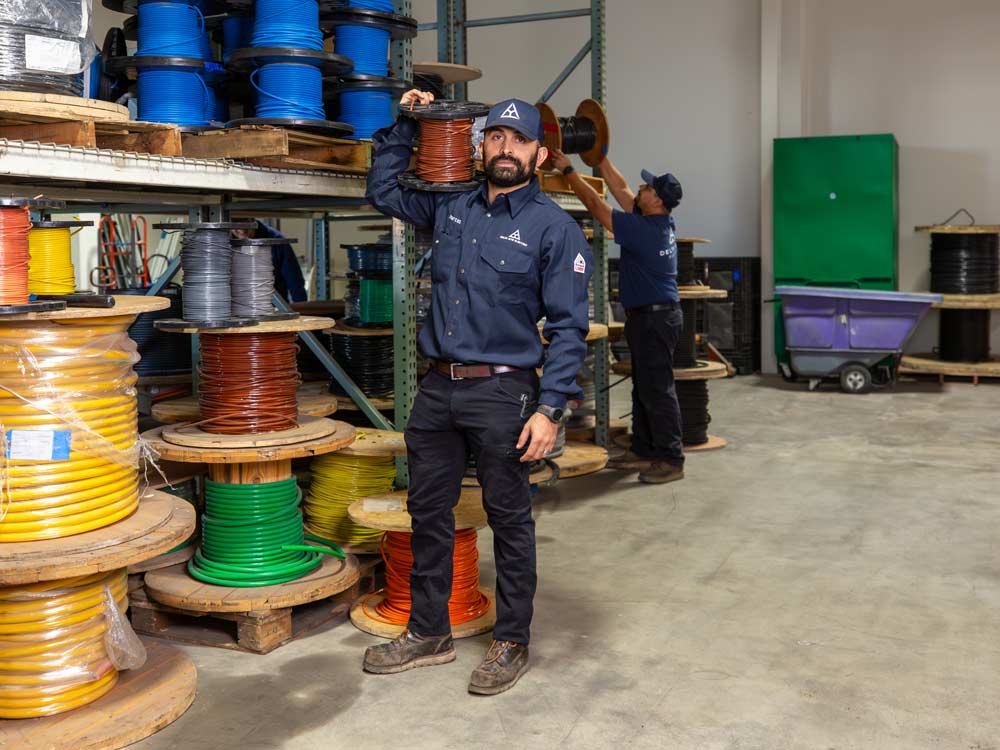As integral components of our technologically advanced society, industrial electricians are the root of smooth manufacturing, distribution, and power generation operations. Tasked with installing, maintaining, and repairing electrical systems in these environments, their work is vital in ensuring the efficiency, safety, and optimal functionality of various industrial systems we rely on daily.
If you find gratification in problem-solving, take pride in meticulous work, and are driven to thrive in a rewarding profession, becoming an industrial electrician may be your ideal career path. This article outlines the path to this career, covering education, apprenticeships, certification, and the vital skills needed. While the road requires commitment and passion, with comprehensive guidance—like the insights from industry leaders at Delta Wye—your pursuit can be an enlightening experience. Let’s embark on this journey, where dedication meets the expertise of seasoned professionals, and discover what it takes to succeed in this dynamic field.
Understanding the Role of an Industrial Electrician
At its core, an Industrial electrician oversees the installation, maintenance, and repair of electrical systems in industrial infrastructures. These electricians work primarily in factories, plants, and other industrial settings, focusing on maintaining and servicing heavy industrial machinery.
As opposed to their industrial counterparts, residential electricians work on electrical systems in homes and other residential buildings. On the other hand, a commercial electrician works in commercial buildings like offices and stores, dealing with larger projects and more advanced electrical systems when compared to residential work. Industrial electricians, the third type, are responsible for even larger-scale electrical operations, often dealing with complex electrical systems designed for industrial machinery.
The daily responsibilities of an industrial electrician are multifaceted. An industrial electrician’s key tasks involve installing new electrical components, troubleshooting and testing existing industrial equipment, and performing preventative maintenance on electrical systems to keep them running efficiently.
Additionally, they work with blueprints and technical electrical diagrams, use various tools, and ensure compliance with local and national electrical codes. Safety is a crucial aspect of their job – the Occupational Safety and Health Administration (OSHA) reported that 166 electrical fatalities occurred in the workplace in 2019, emphasizing the need for adherence to safety standards.
The Benefits and Challenges of Being an Industrial Electrician
Taking up a career in industrial electrical work offers a balance of rewards and challenges characteristic of this field, providing a well-rounded view of one’s future profession.
Benefits
- Attractive Income: Industrial electricians often enjoy a substantial income. The Bureau of Labor Statistics (BLS) reported the median annual wage for electricians, including industrial electricians, to be $60,240 as of 2022. Highly experienced professionals, such as industrial electricians, typically earn considerably more.
- Job Security: The BLS projects that employment for electricians will grow by 6% from 2022 to 2032, in line with the average for all occupations. The need for these skilled professionals to maintain essential industrial electrical infrastructure ensures relatively stable job security.
- Diverse Work Settings: Industrial electricians have the opportunity to work in a variety of settings, including manufacturing plants, power stations, and construction sites. This range of environments can keep work exciting and new.
- Professional Development: This career path enables continuous learning and professional development. As technology evolves, there will be a consistent need for skills upgrading, keeping the job challenging and engaging.
Challenges
- Physical Demands: The work often involves strenuous activities such as lifting heavy industrial electrical equipment, climbing ladders, or working in cramped conditions, which can be physically demanding.
- Safety Risks: Occupational hazards are real – risks of electric shock, burns, and falls are pertinent. As noted by the Occupational Safety and Health Administration (OSHA), there were 166 electrical fatalities in the workplace in 2019.
- Long and Irregular Hours: They sometimes work long hours, weekends, or during emergencies to repair or maintain electrical systems, resulting in an irregular schedule.
- Continual Learning Curve: As technology evolves, so do the skillsets required. This constant need for learning and adapting to new technologies and processes might seem daunting to some.
Despite these challenges, becoming an industrial electrician can be a rewarding career for those who are committed and passionate about the field. Striking the right balance between the benefits and overcoming the hurdles can lead to a satisfying career journey.
Thus, while the role might often be lumped under the broader term “electrician,” an industrial electrician stands apart due to its specialized nature and responsibilities. The position is demanding and rewarding, playing an indispensable part in modern industry.
Steps to Become an Industrial Electrician

Embarking on a career as an industrial electrician involves robust preparation and a well-defined path. The following are critical steps to set up for this career successfully.
1. Acquiring Necessary Education
Becoming an industrial electrician begins with acquiring the necessary foundational education. At a minimum, you’ll need a high school diploma or an equivalent GED. High school courses in mathematics and physics provide the practical and theoretical groundwork that this profession stands upon. Additionally, classes in vocational-technical education offering training in areas such as electronics can serve as a stepping stone, introducing you to the basic principles at play in electrical work.
2. Attending a Trade School or Community College
Once you’ve completed your high school education, consider pursuing a certificate or associate’s degree in electrical technology from a trade school or community college. Such programs delve deeper into subjects vital for future electricians. They cover electrical theory, teaching you about the various aspects of electricity and how they apply to your work. You’ll learn to interpret electrical drawings and understand the layout and symbols commonly used in these diagrams. The program will also explore the specifics of local, state, and national electrical codes. It will also instill good safety practices, ensuring you understand how to minimize risks and safely handle equipment.
3. Completing an Electrician Apprenticeship
The real-world application of these topics comes with your apprenticeship. An apprenticeship program typically lasts three to five years. It combines classroom instruction with on-the-job training under the guidance of an experienced licensed electrician. These programs can be found through professional organizations and trade unions like the International Brotherhood of Electrical Workers (IBEW). An apprenticeship provides invaluable hands-on work experience in real work environments and establishes professional connections that can be beneficial when you’re ready to launch your career.
4. Becoming Certified
Upon completing your apprenticeship, the focus shifts to obtaining an electrician license. Most states in the U.S. require electricians to have a license obtained by passing an examination. This exam tests your knowledge of electrical theory, the National Electrical Code, and state and local building and electrical codes. Depending on your expertise and experience, you might consider different levels of certification, like Journeyman and Master Electrician. These certifications symbolize varying levels of mastery and competency and can significantly affect your employability and upward mobility in this field.
5. Ongoing Learning and Specialization
In this fast-paced world of technological advancements, becoming complacent isn’t an option. As an industrial electrician, you should always be open to learning new things and adapting to the latest industry trends. Additional certifications in specialized areas, such as renewable energy or industrial automation, can open doors to exciting job opportunities. Certifications like the Certified Electrical Safety Compliance Professional also add credibility and merit to your profile.

Becoming an industrial electrician is an ambitious and gratifying career choice. While it demands substantial dedication, effort, and continuous learning, the financial and job satisfaction rewards make this journey worthwhile. With this roadmap, you should feel better prepared to take your first step into this dynamic field.
Essential Skills and Attributes for Success as an Industrial Electrician

Succeeding as an industrial electrician requires more than academic qualifications and technical skills; it demands certain inherent qualities and soft skills. Here are some key abilities that contribute to a successful career in this field:
- Problem-Solving Skills: As an industrial electrician, you’ll often encounter problems requiring swift and appropriate solutions. This could mean identifying why a particular piece of machinery is malfunctioning or how to install intricate industrial electrical systems to meet a plant’s specific needs. Problem-solving solid ability is thus a critical attribute.
- Physical Stamina and Strength: The job often requires lifting heavy items, standing for extended periods, or working in tight spaces. Good physical health and endurance are, therefore, vital.
- Attention to Detail: The profession requires meticulous attention to detail to ensure all components are installed correctly, specifications are met, and safety protocols are adhered to prevent accidents. Even minor oversights can pose serious safety risks or result in system malfunctions.
- Manual Dexterity and Hand-Eye Coordination: Industrial electricians work with various tools and minor components requiring keen hand-eye coordination and steady hands. A high degree of manual dexterity is essential for performing tasks accurately and efficiently.
- Communication Skills: Whether it’s explaining complex electrical concepts to a client, writing reports, or interacting with coworkers, practical communication skills are indispensable.
- Understanding of Safety Measures: Following electrical work’s potential hazards and strictly adhering to safety guidelines is crucial.
- Adaptability: The ability to adapt and learn quickly is beneficial, given the fast-paced technological advancements in the electrical industry.
- Math Skills: A good grounding in mathematics, especially in areas such as algebra and trigonometry, is necessary to help perform tasks, including measuring, cutting and bending wire, and determining electrical loads.
By cultivating these skills and traits, you can increase your competence and potential for success in industrial electricity.
Conclusion
Charting a career path as an industrial electrician requires systematic progression—starting with a foundational education, advanced studies in electrical technology, hands-on training through apprenticeships, gaining relevant certifications, and culminating in continuous growth and learning. Coupling these learning milestones with inherent skills such as problem-solving, precision, stamina, and adaptability can pave the way for a successful career. Despite the challenges that may arise, the engaging nature of the work, job security, and perpetual learning opportunities make it a stimulating career choice. Just like the reliable and comprehensive solutions provided by industry experts such as Delta Wye, your journey in this field can be both stable and exhilarating.
Frequently Asked Questions
1. How long does it take to become an industrial electrician?
Becoming an industrial electrician typically takes between 3 to 6 years. This includes obtaining foundational education, gaining a certificate or associate’s degree in electrical technology, which can last for 1-2 years, and completing an apprenticeship, which usually spans 3-5 years.
2. How do you become an industrial electrician apprentice?
To become an apprentice electrician, you should first ensure you have a high school diploma or equivalent GED, which is often a fundamental requirement. Then, you can seek out industrial electrician apprenticeship opportunities usually found at local electrician unions, such as the International Brotherhood of Electrical Workers (IBEW), or professional associations like the National Electrical Contractors Association (NECA) or Associated Builders and Contractors (ABC). The selection process may include an aptitude test and an interview.
3. What are the education requirements for an industrial electrician?

The most basic education prerequisite for becoming an industrial electrician is having a high school diploma or an equivalent GED, with courses in mathematics, physics, and, ideally, vocational-technical classes introducing basic electrical concepts. Furthermore, obtaining a certificate or associate’s degree in electrical technology from a vocational school or community college is highly beneficial.
4. What are the overall requirements to become an Industrial Electrician?
Overall, becoming an industrial electrician requires a high school diploma or GED, a certificate or an associate’s degree in electrical technology, a 3-5 year apprenticeship, and, in most states, a license obtained by passing an exam. Additionally, industrial electricians must possess strong problem-solving skills, physical stamina, attention to detail, good hand-eye coordination, and strong communication skills.









